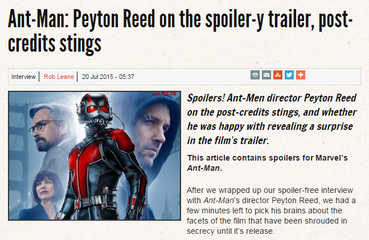If you believe the directors of two of this summer’s big blockbusters, the trailers’ “spoiler-laden” reputation has been ratcheted up another notch.
Colin Trevorrow and Alan Taylor are the directors of two huge 2015 franchise entries, Jurassic World and Terminator: Genisys respectively. Both have recently derided the marketing decisions made on behalf of their films: namely the inclusion of specific scenes in the trailers that gave away a key narrative moment or surprise.
Here's a quick reminder of the trailers in question...
Colin Trevorrow and Alan Taylor are the directors of two huge 2015 franchise entries, Jurassic World and Terminator: Genisys respectively. Both have recently derided the marketing decisions made on behalf of their films: namely the inclusion of specific scenes in the trailers that gave away a key narrative moment or surprise.
Here's a quick reminder of the trailers in question...
| | |
Trevorrow has said that trailer producers “have shown far more… than I would ever have wanted”, claiming the trailer betrayed the “new rules” his film was creating, and (allegedly) making it more challenging for the audience.

Meanwhile, Alan Taylor had “unpleasant conversations” about the inclusion of a scene in one of the Terminator: Genisys trailers that gave away a significant plot twist. Taylor admitted that the initial negative publicity meant that marketing “had to do something game-changing in how the film was being perceived” but was still not pleased by the decision. You can read the interview transcription via Uproxx
Now, this is an old and much debated topic, and not one we’re going to solve anytime soon. My last post for this site, about the history of ‘trailer talk’, demonstrated that we tend to circle the same debates every time trailers are discussed. While the specific “spoiler” tag may be new, the theme of over-revelatory trailers is not. But if Trevorrow and Taylor are making a case that such revelations are not in the audience’s best interest, then surely we have to ask whether such spoilers helped make Jurassic World the fifth biggest box-office performer of all time, and why they didn’t do the same for Terminator: Genisys. If the trailer “spoiler” is such a problem, and so significant it has to be rejected by the film’s directors, then is there a reason why audiences don’t always react in the same way? Could it be that audiences don’t actually object to spoilers, because they reveal interesting narrative or visual evidence that draws some viewers in?
Posts on media websites about trailers often repeat the adage that you can ‘tell’ where a trailer sequence will sit in the film, and can therefore figure out the ending. Yet the Jurassic World example surely suggests that the general audience might not mind: indeed, the director of another big summer film Ant-Man revealed that you have to balance an audience’s ‘sense of discovery’ with giving them ‘every reason in the world to go see the movie’ – including, in this case, revealing the appearance of another Marvel hero in a trailer for the film.
Damned if you do, damned if you don’t. And let’s not pretend this is new: go and watch the Casablanca trailer, which includes the final Rick-Strasse confrontation at the airport; or The Empire Strikes Back trailers that feature brief shots of ‘twist’ moments, including the Luke-Darth Vader lightsaber battle. Trailers have always shown events out of sequence, constructing their own narrative, hoping (in part) to encourage people to go back to the cinema. If we look to the results of our first audience survey, only 47 respondents (out of 525) made a specific reference to the trailer as a “spoiler” when asked about the trailer-film relationship, although there was plenty of related talk around the trailer as over-revelatory, inaccurate or featuring the best bits. Yet it seems clear from the sources cited above, and the discussion that accompanies it on such media sites, that “spoiler” and “trailer” are now closely connected in the minds of part of the audience.
What isn’t clear, and this is something I first discussed in a 2008 Convergence article, is how the rapid growth of online video as a marketing tool has affected the promotional landscape in which the trailer sits. The Casablanca trailer was likely the only footage the potential audience saw, with few additional sources of movie narrative information outside film reviews, radio features, and fan magazines – all of which were non-visual, with no film programmes on television until the late 1940s / early 1950s (for more on these, including the use of the word ‘trailer’ to refer to one longer clip from a movie, I’d recommend Su Holmes’ work). The Empire Strikes Back was part of a more media-saturated world (with TV spots, ‘Making Of’ specials, clips shown on a range of TV shows, tie-in novelisation, sticker books etc.) but the release of film clips was still relatively controlled and discreet.
Since the 1990s, however, and particularly since the advent of decent online video, the increase in pre-release footage is astonishing. Alongside two to three trailers, TV spots, web exclusive clips, and video from special events like the recent Comic-Con, the sheer availability of material available ahead of film viewing is at an all-time high. While this doesn’t explain the recent debate about the “spoiler” trailer, or whether a spoiler is good or bad for business, it does suggest that trailers (likely still the most viewed of those elements, across many audiences) now needs to work harder to stand out among other audio-visual previews…

 RSS Feed
RSS Feed